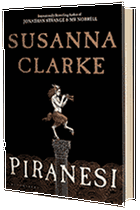
British author Susanna Clarke won a World Fantasy Award and legions of fans with her debut novel, Jonathan Strange & Mr Norrell, a classic in its own time. Now, in her first novel in almost 16 years, Clarke introduces readers to a dreamlike new world and the charming, curious soul who lives in it and loves it. A bold blend of mystery-thriller and speculative fiction, this literary fantasia inspired by the etchings of 18th-century Italian artist Giovanni Battista Piranesi explores the resilience of the human spirit and challenges the concept of what it means to be lost.
In a vast, austere labyrinth of halls and stairs "like an infinite series of classical buildings knitted together" and filled with ocean tides, a lone occupant devotes his life to naming its statues, cataloging its nooks and crannies, and eking out a spartan existence from the fish and seaweed he harvests from its waves. "I have climbed up to the Upper Halls where Clouds move in slow procession and Statues appear suddenly out of the Mists. I have explored the Drowned Halls where the Dark Waters are carpeted with white water lilies," he records in his meticulously indexed journals. He believes that "since the World began it is certain that there have existed fifteen people," but 13 are skeletons he has found and watches over as a reverent caretaker. Currently he can only confirm that the world, which he calls the House, has two occupants: himself and an older man he calls the Other. This man is his colleague, he explains, and they are searching together for "a Great and Secret Knowledge" hidden somewhere in the House. The Other calls the narrator Piranesi, "which is strange because as far as I remember it is not my name," and visits every Tuesday and Friday for one hour. Piranesi enjoys spending time with his friend but also worries about the Other's welfare. The Other often turns up with supplies like notebooks, shoes and "shining devices," even though Piranesi has never found any similar objects in the House. Believing the House provides for its occupants, he assumes it provides these extra resources to make up for gaps in the Other's survival skills and appreciates the few objects the Other shares with him.
Recently, the Other has begun to behave oddly, asking if Piranesi remembers "Batter-Sea," when no one can remember a made-up place. Their peculiar talks culminate in the astounding revelation that he and Piranesi are not the only living human beings in existence. When Piranesi greets the announcement with joy and dubs the newly discovered person "16," the Other cautions, "16 is my enemy. And so, by extension, yours too." He instructs Piranesi to avoid 16 at all costs or risk madness. Piranesi feels torn--he trusts the Other, but he longs to hear the voice of another person. Soon he finds his harsh but fulfilling existence challenged by secret messages, unfolding mysteries and odd discrepancies in his own writings. Why, he wonders, would he have dated his oldest journals with the random numbers 2011 and 2012? As the nature of the House and his presence there slowly come to light, the man called Piranesi must decide whom to trust if he wants to survive long enough to learn the whole truth.
Born into the shadow of fantasy titan Jonathan Strange & Mr Norrell, Clarke's meditative mystery will face high expectations and, inevitably, the question of how it compares to its famous predecessor. Despite their common provenance, comparison is difficult, as they are distinct, and distinctly brilliant. Rather than sprawling baroque grandeur, this story and its setting share the essence of a real labyrinth, subtle yet unadorned, offering a path of contemplation and change. Clarke's narrator lends credence to Hamlet's famous assertion, "There is nothing either good or bad, but thinking makes it so." The reader will realize within the first few pages that something is terribly off about Piranesi's circumstances, but in his innocence, he sees his spartan prison as an amalgamation of noble wilderness, holy temple and compassionate deity. His mantra "the Beauty of the House is immeasurable; its Kindness infinite" seems dangerously naive at first, but between his facility at creating a life from its harsh conditions and sonorous descriptions of its bleak beauty, a portrait slowly forms of a person utterly whole and at home in his environment. The quintessential wise fool, he serves as a reminder that human needs are deeper and simpler than modern life suggests.
Clarke's wry, masterful use of dramatic irony fuels both humor and suspense as the story builds to its climax with disciplined pacing. Though brief in length, it holds its secrets tightly until the right moments and leaves one with the sense of having glimpsed a boundless cosmos through a keyhole. Piranesi marks a sophisticated and triumphant return for one of the finest novelists of this era. --Jaclyn Fulwood

